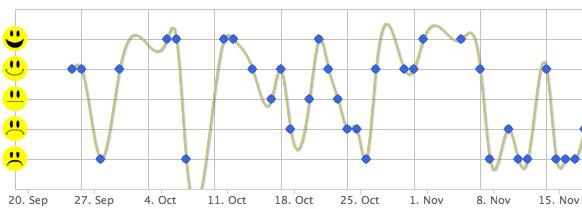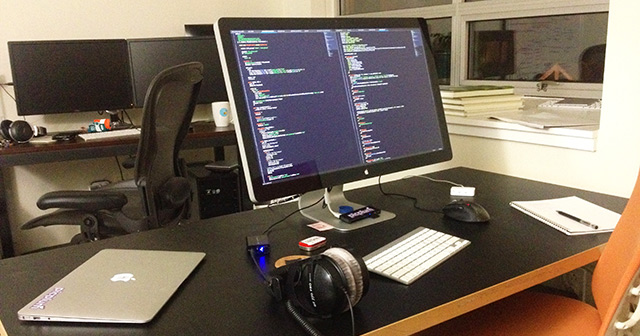Novice startups: stop suffering garbage
- Transfer
- Recovery mode
 This is a translation of a TechCrunch article written by Paul Stomato, co-founder of the Picplum photo printing service supported by Y Combinator. In this impressive motivating post, Paul talks about how, in his opinion, startups need to be done correctly .
This is a translation of a TechCrunch article written by Paul Stomato, co-founder of the Picplum photo printing service supported by Y Combinator. In this impressive motivating post, Paul talks about how, in his opinion, startups need to be done correctly . A small digression into history. Do you remember the first time you connected to the Internet? Even before your computer was always in touch and when access to online had to be planned. The joy of seeing new browsers, such as the advent of Phoenix. Your excitement when you first tried to surf the Internet with your new high-speed connection. This was a time when sites rarely used JavaScript, and DHTML was the buzzword of the year. It's hard to believe that Chrome is just a few years old.
When I first came to California for an internship at Yahoo! (the news about which Valleywag immediately blew up . Remember this site?), I knew that in the end I would have to move here. I returned there every year, visiting friends and checking out startups .
Every time I come to San Francisco and look at the horizon, I recall that I was lucky to be at that time and the place where I wanted to be so long, next to such a vibrant and strong technical community. And it would be better for me not to screw up, wasting time and working unproductive. I am not here to discuss your ideas for startups, give advice on Backbone.js, talk about how to find your first clients and advise how to set up your profile in AngelList. I just want to say a few words about how to work. This post is for beginners about how the hell to do the right thing.
It all started with my tweet. I was annoyed that friends who had just started working on a startup dropped their hands. After more than 150 retweets, I decided to talk more about my ideas here.
I'm going to teach a course for beginner startups called Stop Suffering Garbage, Keep Working.
- Paul Stamatiou (@Stammy) April 23, 2012
We live in an amazing time — perhaps the perfect time to build companies . And it pains me to see how start-up entrepreneurs miss this huge chance, falling into the trap that it is cool to do a startup, participating in endless meetings and spending too much time on unnecessary things ( known as problems with Maserati ), while they are completely not busy with fanatical programming . Stratapas are hard work. It may end with the need to look for work or it may end with a wide smile and section 280G in the tax return, but one way or another you will gain a lot of experience.
Your work days are holy
Think about potential costs here. You could be satisfied by making a fortune with six zeros, but you decided to screw up the fever with your startup. It takes courage. Then why are you giving up and wasting time? This is not work from 9 to 5. You will only hurt yourself if you do not understand this and do not make your ass work. Please avoid all these endless meetings that you go to only for the meetings themselves. As Michael Arrington says : "Use all your free time to start spending it with serious people, doing serious things."
Does anyone want to meet this week? If they are not related to your case, cancel them., or move on weekends. If they really want to meet, they will also sacrifice their days off.
However, I will make one exception. I am a big believer in the idea of “pay ahead." If someone needs real help, I am always ready to lend a hand. In this way, I am returning the assistance that people like George Zachary, Dan Martell, Hiten Shah and Noah Kagan provided to novice entrepreneurs like me, spending countless hours with them as long as I can remember.
Get ready for the ups and downs
You will have bad days. Getting used to it will not be easy for any new entrepreneur. Once I began to monitor my daily mood for several months at a time when I was working on my last startup ( this was when we raised funds ).

Find your chip
This is what Marissa Mayer talked about when she talked about how to prevent burnout and I think it seems to be true. What do you need to do every week to keep your mind clean ? Running a few hours a week and occasionally watching electronic dance music shows with my business partner helps me . These chips allow me to feel more energetic and happy, which you cannot say about attending endless technical meetings and conferences.
What is your plan?
Picplum is my third startup, and if there is any significant difference between my last startups, this is definitely our planning. I’ll be the first to say that I have a bad habit of always wanting to build something first. New idea? Let's start with javascript. Wrong! Fortunately, I have a wonderful co-founder who keeps me in check and reminds me to first identify the tasks. If you are not fortunate enough to create a product that solves your own problems and you are a target user, you need to take a step back and throw away all your assumptions.
Choose any project management tool and start using it. Will it be Trello, Hackpad, Asana, Flow, Sprintly or something else - just pick one. Keep track of every idea, wish, or mistake, but keep a close eye on your priorities. Do not let anyone use their own systems, because they will never hold back Asana and will always be one step behind.
Not sure if it is really worth your time to fix it right now? KISSmetrics Hiten Shah once said something to me a few years ago that put me at a loss:
For those clients who send small requests by e-mail to add features and settings: do not correct anything until you receive an email from one hot-tempered user in the form of an entire essay.
I learned one thing about myself: when we decide how long a new function or update will take, I most often think over everything related to it and write down each step. This applies, at least to all that relates to the user interface. For example, we recently developed and made a new shared page for the new Picplum . When I first started working on it, I thought it would be a simple project for half a day, which I just connect to the current layouts and maybe add one main view. Easy.
Although this could be the path that we would choose, we decided to take a step back and determine the purpose of this page. What do we want the user to do right away? Does he need to use the same templates as on other pages? This was followed by a productive 30-minute chat with several sketches, as a result of which we got a much better understanding of what we wanted the user to receive. I figured out 5 options in Photoshop, worked a little on the design, and made one, which we then selected.
You can achieve a more stable result if you change your understanding of the duration of this task from the hasty “I need to do this today” to a more effective “let's plan it and take a little more time if necessary.” The best product and best code that you don’t have to redo twice later.
This method has another side: to spend days and weeks “planning” a single function and thinking that this is the real work. Thinking about how to do something does not mean the action itself. I have seen too many startups who really like all the notes they made last week about what they wanted to do. Just go make them and surprise me with your real progress .
Get more feedback.
What I'm used to doing all this time: to spend many hours and days doing the job perfectly, only to understand that we and the co-founder have two different points of view on how all the parts should work together.
Get feedback as often as possible.
But how can you quickly get feedback so as not to seem condescending and beg for updates in the affairs of the co-founders? Just make it a habit. When one of us asks: “What are you working on?” Or “How are you doing with X?” It’s unchanged “what the hell is he doing,” but only some friendly supervision and an offer to help. Make sure you and your cofounder control each other with this simple habit.
What good is these small status updates here and there? Fewer meetings.
Keep it clear and iterative. For me, this is often sending a screenshot to Campfire with Akshay or rotating my monitor to make it easier to talk about something. The only thing that got attached to me was Jeffrey Veen's Speech on Design for Natural Disasters . He talked about how to conduct product reviews and keep them constructive:
A review is not a forum for expression. This is a forum for solving problems.
Instead of saying, “I don't like blue,” ask, “Why should it be blue?” Ask if this is a constructive conversation or not. If you need to make a decision, do it. If you need ideas, clarify this and engage in a constructive conversation.
Be decisive
There is nothing worse than trying to paint a new feature or product and end up with even more questions. “Yes, we can do it” is not an acceptable answer. Entrepreneurs must be able to make decisions quickly and move forward with their help. Delays will not simplify the decision (unless, of course, you are waiting for a few days for more detailed data on A / B testing or more complete statistics of visitors for your decision on data management). Make a decision, write it on the Asana list, assign those responsible and get back to work.
When you get stuck
If you can’t figure it out within 20 minutes, ignore it if it doesn’t prevent you from moving on, or ask your co-founders. My co-founder Akshay has succeeded in fulfilling this 20-minute rule. If you spend 2 hours trying to correctly connect events together or find out why your optimized RequireJS build does not work, you both waste time and do not use your resources to their full potential. Regarding resources, I mean your smart co-founders. A fresh look always helps.
Respect personal space
Decide how you work better . It may look a little unusual, but when I really want to do the work, I start closing the clock in OS X, close everything that can produce sounds (except Spotify, of course), close all browser tabs that are not work related, and make sure that nothing distracts my mind, for example, small urgent tasks that need to be solved first. You may need to improve your workplace .

Make sure you know what you and your co-founder need in order to be productive. If it means leaning on work every day and it doesn't drive you crazy, then so be it.
Good luck
You can be bad at many things ... and as long as you stay focused on what value you bring to users and customers, and you have something unique and valuable ... you go through all this.
- Mark Zuckerberg
